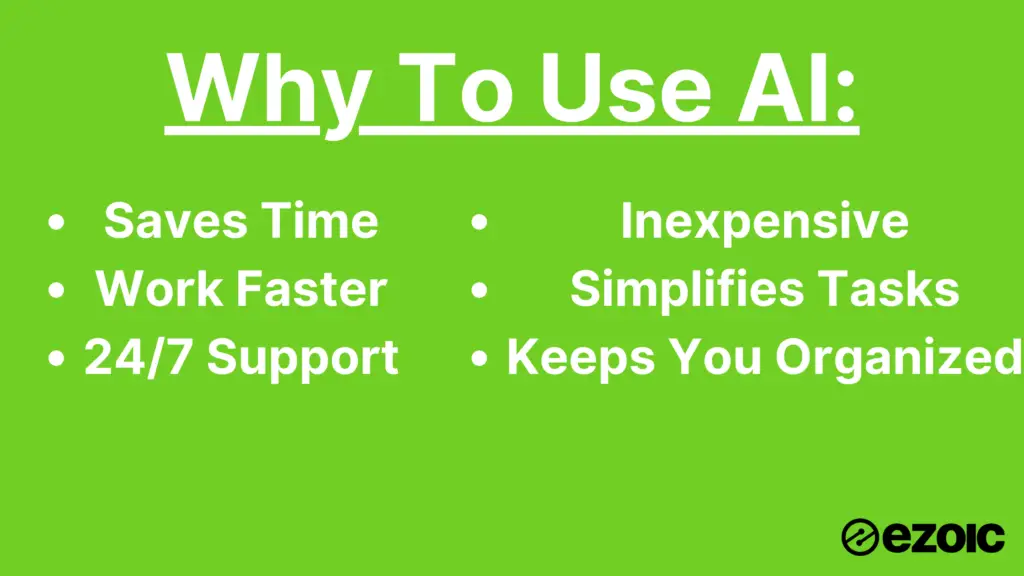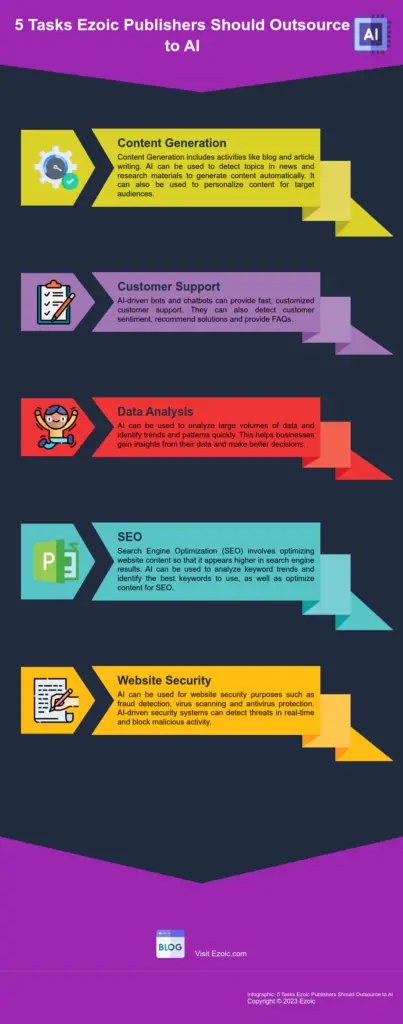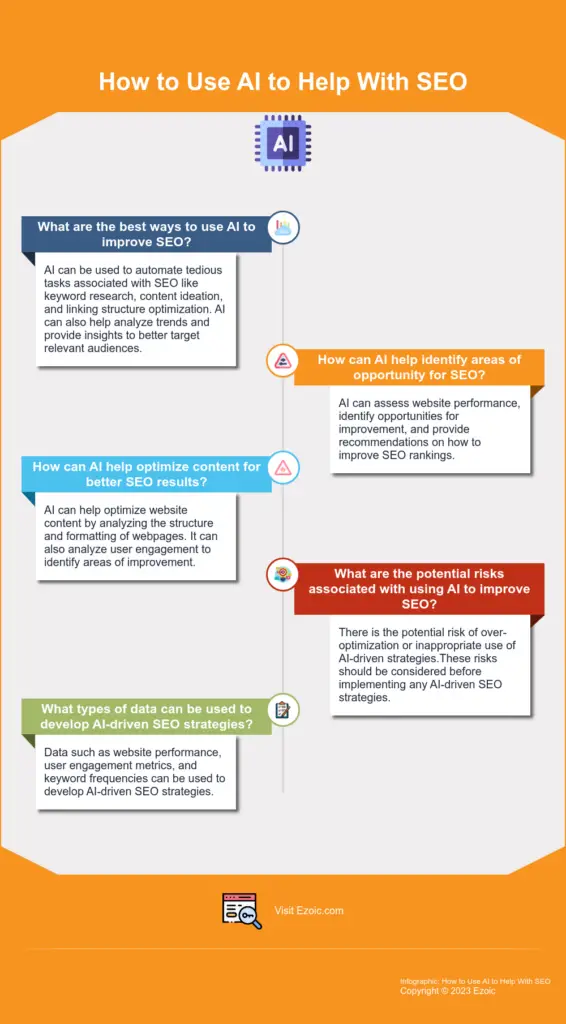
5 Tasks Ezoic Publishers Should Outsource to AI

Get helpful updates in your inbox
With some thousands(!) of new AI tools that come out every week, artificial intelligence has made remarkable strides in recent months, revolutionizing various industries and transforming the way we live and work.
AI refers to the development of computer systems that can perform tasks that typically require human intelligence, such as problem-solving, decision-making, and learning, all of which heavily impact the digital publishing industry in particular. Digital publishing professionals everywhere are seeing massive changes in their industry due AI, unlocking significant potential for their sites.
One notable advancement in AI is the rise of natural language processing (NLP) and machine learning algorithms. NLP allows machines to understand and interpret human language, enabling chatbots and virtual assistants to communicate effectively with website visitors and provide personalized assistance. Machine learning algorithms enable AI systems to analyze vast amounts of data, extract patterns, and make accurate predictions, empowering website owners with valuable insights to optimize their online presence.
Savvy publishers and website owners can use AI to massively increase their content output, research, and marketing across the board for their site. AI-powered solutions can automate repetitive and time-consuming tasks, freeing up website owners to focus on core business activities. For instance, content generation, which typically demands significant time and effort, can be outsourced to AI-based tools that can generate high-quality, relevant content quickly and efficiently. This saves website owners both time and costs associated with hiring content writers.
AI algorithms can perform complex tasks with speed and precision, often outperforming human capabilities. For instance, data analysis, a critical aspect of website management, can be outsourced to AI-powered analytics tools, which can leave Ezoic publishers with far more time and resources to do what you do best — connect with your audience. These AI tools can process large datasets, identify patterns, and extract actionable insights, enabling website owners to make data-driven decisions promptly.

There are countless real-life examples of publishers, companies, and corporations using AI to make their lives far easier. Companies like Google, Amazon, and Apple have developed advanced chatbot and virtual assistant technologies such as Google Assistant, Amazon Alexa, and Apple’s Siri. These AI-powered assistants can engage in natural language conversations, answer user queries, and perform various tasks like booking appointments, ordering products, or providing personalized recommendations. Website owners can leverage such AI assistants to enhance customer support and engagement.
Advancements in AI have led to significant breakthroughs in image and voice recognition technologies. Companies like Google and Microsoft have developed powerful AI models that can accurately identify objects, faces, and even emotions from images. Voice recognition technology has also improved, enabling voice-controlled applications and devices. These advancements allow website owners to optimize their website for visual and voice search, enhancing user experience and increasing discoverability.
Website ownership plays a pivotal role in today’s digital landscape, enabling businesses and individuals to establish a strong online presence. The advancements in AI offer numerous benefits to website owners, from automating tasks to providing valuable insights and enhancing user experience. By outsourcing tasks to AI-powered solutions, website owners can save time, reduce costs, and leverage the efficiency and accuracy of AI algorithms.
Task 1: Content Generation
Content creation poses several challenges for website owners. These challenges can hinder their ability to consistently produce engaging and high-quality content. Common challenges include:
Creating content demands a significant amount of time and effort. Website owners often struggle to dedicate sufficient time to content creation while managing other aspects of their business or website. Small business owners or individuals running websites also may have limited resources, such as a small team or budget for content creation. This limitation makes it difficult to produce a high volume of content consistently.
Generating quality content requires expertise and in-depth knowledge of the subject matter. Not all website owners possess the necessary expertise or have the resources to hire specialized content creators for each topic they want to cover. Furthermore, keeping content relevant and up to date is crucial for attracting and retaining readers. However, staying informed about the latest trends, industry developments, and consumer interests can be challenging for website owners.
Artificial Intelligence (AI) has revolutionized content creation by introducing advanced tools that assist website owners in generating high-quality content efficiently. AI-powered content generation tools leverage natural language processing, machine learning, and data analytics to automate and enhance the content creation process. These tools address the challenges faced by website owners and provide valuable support.
Here are some examples of AI-powered content generation tools:
- Natural Language Generation (NLG): NLG tools use AI algorithms to analyze data and produce human-like text. They can generate content in various formats, such as articles, blog posts, product descriptions, and social media captions. NLG tools enable website owners to create content quickly and efficiently.
- Content Curation Platforms: AI-driven content curation platforms aggregate and curate relevant content from various sources. These platforms employ AI algorithms to filter and select the most valuable content, saving website owners time and effort in manually searching for and curating content.
- Content Ideation Tools: AI-powered content ideation tools help website owners generate new ideas for their content strategy. These tools analyze user behavior, trends, and industry data to provide insights and suggestions for relevant and resonating content topics.
Ezoic publishers may balk at the prospect of having AI create content for them — after all, if you’re a successful publisher you’ve probably seen your success through learning how to create your own top-quality content. But outsourcing content generation to AI-powered tools offers several benefits:
First, AI-powered tools significantly reduce the time and effort required to create content. They can quickly generate content based on predefined parameters, freeing up website owners to focus on other crucial aspects of their business. Additionally, outsourcing to AI can be more cost-effective than hiring a team of content creators or freelancers.
Next, AI-powered tools produce high-quality content that is grammatically correct, engaging, and relevant to the target audience. These tools utilize advanced algorithms to analyze user preferences, search trends, and industry data, ensuring that the generated content aligns with current consumer interests.
By leveraging AI-powered content generation tools, website owners can overcome challenges such as time constraints, limited resources, and the need for expertise. These tools offer time and cost savings while improving the quality and relevance of the content. Incorporating AI into content creation enables website owners to streamline their content generation process and deliver valuable content that engages readers and drives business growth.

Task 2: Customer Support
Customer support plays a vital role in ensuring customer satisfaction and loyalty. A negative user experience significantly hurts your site’s potential for revenue, return traffic, and SEO. For websites, providing effective customer support is essential for several reasons:
- Customer Satisfaction: Prompt and helpful customer support leaves a positive impression on website visitors, fostering trust and loyalty. It shows that the website values its customers and is committed to addressing their concerns.
- Enhanced User Experience: Good customer support enhances the overall user experience on a website. When visitors encounter issues or have questions, efficient customer support can provide quick resolutions, ensuring a seamless and enjoyable browsing experience.
- Reputation Management: Effective customer support contributes to a positive brand reputation. Satisfied customers are more likely to spread positive word-of-mouth and recommend the website to others, leading to increased visibility and potential customer acquisition.
Artificial Intelligence (AI) has revolutionized customer support by introducing AI-driven chatbots and virtual assistants. These technologies can provide automated support, address common queries, and assist users in real-time. If you’re wondering about how AI can develop customer support solutions, here are a couple methods:
First, chatbots. AI-powered chatbots simulate human conversation and can handle a wide range of customer queries. Chatbots use natural language processing algorithms to understand user inquiries and provide appropriate responses. They can offer instant assistance, guiding visitors through common tasks or helping them find the information they need.
There are also virtual assistants. Virtual assistants, such as voice-activated AI systems or chat-based assistants, go beyond simple queries and perform complex tasks. They can handle more personalized interactions, such as booking appointments, providing product recommendations, or even processing transactions.
AI can also offer 24/7 availability, able to help users all around the world at any time. One of the significant advantages of AI-driven customer support is its ability to provide round-the-clock assistance. Unlike human agents who have limitations in availability, AI-powered chatbots and virtual assistants can offer support 24/7, catering to customers in different time zones and providing immediate assistance whenever needed.
AI-powered customer support solutions can provide instant responses to customer queries, eliminating the wait time associated with traditional support channels. Chatbots and virtual assistants can quickly analyze inquiries and provide accurate and relevant information or direct customers to the appropriate resources.
In short, outsourcing customer support to AI can lead to significant cost savings for website owners. Hiring and training human support agents can be expensive, especially for small businesses. AI-powered solutions offer a cost-effective alternative, as they require minimal ongoing maintenance and can handle a high volume of inquiries simultaneously.

There’s also the potential of scalability: AI-driven customer support solutions can easily scale to accommodate increasing customer demands. Whether it’s handling a surge in inquiries during peak times or managing a growing customer base, AI-powered systems can handle the workload without compromising response times or customer satisfaction.
Effective customer support is crucial for websites to ensure customer satisfaction, enhance user experience, and manage brand reputation. AI-driven chatbots and virtual assistants have revolutionized customer support by providing 24/7 availability and delivering quick, accurate responses.
Outsourcing customer support to AI offers benefits such as cost-efficiency, scalability, and improved customer experience. By leveraging AI technologies, website owners can provide seamless and efficient support to their users, fostering customer loyalty and driving business growth.
Task 3: Data Analysis
Any publisher can get lucky and post an article that happens to go viral. But you have to be able to understand the numbers and data of your site to sustain success.
Data analysis plays a critical role in website management, offering valuable insights into user behavior, website performance, and overall business growth. Analyzing your site’s real data helps website owners gain a deep understanding of how users interact with their website. By analyzing metrics like page views, click-through rates, bounce rates, and conversion rates, website owners can identify user preferences, patterns, and pain points, enabling them to optimize the user experience and improve engagement.
Data analysis allows website owners to measure the effectiveness of their marketing campaigns, content strategies, and overall website performance. By tracking key performance indicators (KPIs), such as traffic sources, conversion rates, and revenue, website owners can identify areas of improvement and make data-driven decisions to enhance their online presence.
It also provides website owners with insights into their competitors’ strategies and market trends. By monitoring competitor performance, keyword rankings, and industry benchmarks, website owners can identify opportunities and stay ahead of the competition, ensuring their website remains relevant and competitive.
Artificial Intelligence (AI) has revolutionized data analysis by introducing advanced analytics tools that leverage machine learning algorithms to process and interpret vast amounts of data. AI-powered predictive analytics tools use historical data and machine learning algorithms to forecast future trends, user behavior, and business outcomes. These tools enable website owners to make proactive decisions, optimize marketing campaigns, and anticipate customer needs.
Natural Language Processing (NLP) technology allows AI analytics tools to analyze unstructured data, such as customer reviews, social media comments, and support tickets. By extracting insights from unstructured data sources, website owners can gain a deeper understanding of customer sentiment, emerging trends, and areas of improvement. AI analytics tools can also automate the process of generating reports and visualizing data. These tools can create interactive dashboards, graphs, and charts, providing website owners with real-time and easily digestible insights, eliminating the need for manual data compilation and analysis.
AI-powered analytics tools can handle large volumes of data more efficiently than traditional methods. They can quickly process and analyze complex datasets, saving website owners time and resources. By automating data analysis, AI tools can uncover valuable insights that may be overlooked with manual analysis.
AI-based data analysis provides website owners with actionable insights that can drive informed decision-making. By identifying patterns, correlations, and trends in the data, AI tools help website owners make data-driven decisions that optimize website performance, marketing strategies, and overall business outcomes.
AI analytics tools are highly scalable, allowing website owners to analyze growing datasets without compromising performance. As websites and user bases expand, AI-powered data analysis can adapt to the increasing volume of data, ensuring accurate and timely insights.

Outsourcing data analysis to AI eliminates the need for hiring and training a dedicated team of data analysts. AI analytics tools offer a cost-effective solution as they require minimal human intervention and can provide robust insights at a fraction of the cost.
Data analysis is crucial for website owners to understand user behavior, measure performance, and gain a competitive edge. AI-based analytics tools revolutionize data analysis by providing efficient processing of large datasets, actionable insights, and improved decision-making. Outsourcing data analysis to AI offers benefits such as scalability, cost-effectiveness, and the ability to extract valuable insights from vast amounts of data
Task 4: Search Engine Optimization (SEO)
Search Engine Optimization (SEO) is crucial for website owners as it directly impacts their online visibility and organic traffic. SEO techniques help websites rank higher in search engine results pages (SERPs), increasing their visibility to potential visitors and driving organic traffic. By optimizing content and website structure to target relevant keywords, websites can reach their targeted audience and establish credibility and trust among users.
Artificial Intelligence (AI) has revolutionized SEO with advanced tools and algorithms that enhance website optimization. AI-powered Natural Language Processing (NLP) algorithms enable search engines to understand the context and meaning of website content, delivering more accurate search results. AI tools can analyze website content, providing recommendations for optimizing keywords, meta tags, and overall content structure. Additionally, AI-powered SEO tools can track and analyze website rankings, offering insights into keyword performance, competitor rankings, and trends.
AI-powered SEO tools can also analyze extensive data to identify relevant keywords and phrases with high search volumes and low competition. Outsourcing keyword research to AI saves time and ensures optimal keyword targeting.AI tools can continuously monitor website rankings for targeted keywords, providing real-time updates. Website owners can proactively take measures to improve rankings based on AI insights.
Outsourcing SEO tasks to AI is a cost-effective option compared to hiring dedicated SEO professionals or agencies. AI-powered SEO tools offer comprehensive functionalities at a fraction of the cost. AI-powered SEO tools can handle large amounts of data and analyze it efficiently. As websites grow, AI tools can adapt to changing SEO requirements, ensuring scalability and consistent performance.
In short, SEO plays a crucial role in improving website visibility and attracting organic traffic. AI-powered SEO tools and algorithms enhance optimization by providing advanced keyword research, content optimization, and rank tracking capabilities.
Outsourcing SEO tasks to AI offers benefits such as enhanced keyword research and optimization, efficient monitoring of website rankings, cost-efficiency, and scalability. By leveraging AI in SEO, website owners can improve their online presence, attract targeted traffic, and stay ahead of the competition in search engine rankings.

Task 5: Website Security
Website security has become a top priority for businesses and individuals alike. The increasing prevalence of cyberattacks and data breaches has highlighted the critical need for robust website security measures. Website visitors expect their personal information to be safeguarded when interacting with websites. Implementing strong security measures helps build trust and confidence among users, fostering long-term relationships and encouraging repeat visits.
Websites often handle sensitive user data, such as personal information, payment details, and login credentials. A breach in website security can lead to severe consequences, including financial loss, reputational damage, and even legal liabilities. Prioritizing website security helps ensure the protection of sensitive data from unauthorized access or misuse.
Many jurisdictions have enacted strict data protection laws, such as the General Data Protection Regulation (GDPR). Compliance with these regulations is not only a legal requirement but also essential for maintaining the reputation and integrity of websites. Robust website security measures help website owners meet compliance standards and avoid penalties.
Artificial Intelligence (AI) has emerged as a powerful tool in the field of website security, providing innovative solutions to combat evolving cyber threats. AI-driven security solutions leverage machine learning algorithms and advanced analytics to detect and mitigate potential risks.
AI algorithms can analyze vast amounts of data, patterns, and network behaviors to identify anomalies and potential security threats. By continuously monitoring website activities, AI-powered security solutions can detect and prevent attacks in real-time, mitigating the risk of data breaches or system compromise. Additionally, AI algorithms can establish baseline behavior patterns for websites and users. Any deviation from these patterns triggers alerts, allowing website owners to take immediate action against suspicious activities or potential breaches.
AI-powered security solutions excel in real-time threat detection and prevention. They can rapidly identify and respond to emerging threats, minimizing the risk of data breaches or unauthorized access. With AI-driven security, website owners can stay one step ahead of cybercriminals and protect their website and user data.
AI-powered security solutions offer a proactive defense mechanism against cyberattacks. By continuously analyzing and learning from data patterns, AI algorithms can adapt and evolve to detect new and emerging threats. This ensures that websites are equipped with the latest security measures to fend off sophisticated cyberattacks.
Website security is of paramount importance in today’s digital landscape. The growing threats of cyberattacks and data breaches require website owners to prioritize robust security measures. AI-driven security solutions provide advanced threat detection and prevention capabilities, leveraging machine learning algorithms to analyze data patterns and protect against evolving cyber threats.
By outsourcing website security to AI, website owners can benefit from real-time threat detection and prevention, as well as enhanced protection against cyberattacks. Implementing AI-driven security solutions helps safeguard user trust, protect sensitive data, and ensure compliance with data regulations, ultimately leading to a secure online environment.
Conclusion
AI has emerged as a game-changer for Ezoic publishers, offering a multitude of opportunities to streamline operations, enhance user experience, and drive business growth. By outsourcing certain tasks to AI-powered solutions, publishers can unlock significant benefits and stay ahead of the curve in the digital publishing industry.
Outsourcing content generation to AI-powered tools enables website owners to save time and costs while producing high-quality and relevant content consistently. AI algorithms can perform complex data analysis tasks swiftly and accurately, providing valuable insights for data-driven decision-making. AI-driven customer support solutions offer 24/7 availability, cost efficiency, and scalability, ensuring prompt and efficient assistance for website visitors. AI-powered SEO tools optimize website visibility and organic traffic, while AI-driven security solutions fortify website defenses against cyber threats.
So, whether you’re looking to generate engaging content, provide seamless customer support, analyze data, optimize your SEO strategy, or enhance website security, AI has the potential to revolutionize your Ezoic publishing journey. Embrace the power of AI and let it propel your website to new heights.

Anthony Moore is a writer, speaker, and coach. He's helped hundreds of entrepreneurs create successful businesses, and has gained over 7 million views for his work on entrepreneurship, personal growth, and productivity.
Featured Content
Checkout this popular and trending content

Ranking In Universal Search Results: Video Is The Secret
See how Flickify can become the ultimate SEO hack for sites missing out on rankings because of a lack of video.
Announcement

Ezoic Edge: The Fastest Way To Load Pages. Period.
Ezoic announces an industry-first edge content delivery network for websites and creators; bringing the fastest pages on the web to Ezoic publishers.
Launch

Ezoic Unveils New Enterprise Program: Empowering Creators to Scale and Succeed
Ezoic recently announced a higher level designed for publishers that have reached that ultimate stage of growth. See what it means for Ezoic users.
Announcement
